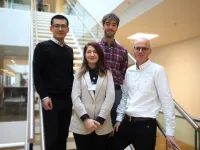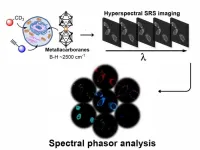Proteins and Networks: Bonn neuroscientist receives 1.2 million dollars for research into psychiatric disorders
Chan Zuckerberg Initiative funds project by Dr. Sabine Krabbe
2023-11-10
(Press-News.org)
Neurodegenerative diseases like Alzheimer’s and Parkinson’s can be associated to depression and anxiety. Dr. Sabine Krabbe, a neuroscientist at DZNE’s Bonn site, is receiving 1.2 million US dollars from the Chan Zuckerberg Initiative to understand the mechanisms involved in the onset of these syndromes. To this end, she aims to examine the function of the brain’s “emotion center” using new methodologies to examine the function of single cells in experimental mouse models. The study will run for four years and intends to pave the way for better treatments in humans affected by these conditions.
“Psychiatric disorders are shared by multiple neurogenerative diseases, affecting around 60 to 70 percent of patients. Anxiety and depression are particularly common,” says Sabine Krabbe. “These issues affect the patients’ well-being and severely reduce their quality of life. Remarkably, they can occur years before the onset of memory problems or movement disturbances. In other words, long before Alzheimer’s, Parkinson’s or another neurogenerative disease is diagnosed. This indicates that there must be early biological causes in addition to the mental burden later caused by diagnosis.” With the funded project, the neuroscientist, who heads a research group at DZNE’s Bonn site, aims to contribute to a better understanding of the underlying phenomena. She says: “I not only want to understand the neuronal processes, but also find approaches so that psychiatric disorders associated with neurodegenerative diseases can be treated better.”
Spotlight on the emotion center
At a microscopic level, diseases such as Alzheimer’s and Parkinson’s have especially one thing in common that might be related to psychiatric problems: protein deposits in the amygdala, the brain region that is particularly involved in controlling emotions. Hence it is sometimes called the brain’s “emotion center”. “My assumption is that these proteins disrupt the neuronal networks within the amygdala and that this causes the psychiatric phenotypes. In this respect, my research focuses on the amygdala and specifically on psychiatric symptoms in neurodegeneration. We want to find out how these abnormal proteins affect the amygdala. To date, their influence has mainly been investigated in other brain areas.”
Behavioral experiments
The research project is scheduled to run for four years and is extremely complex, as it combines extensive behavioral experiments with sophisticated microscopy methods. The focus of the studies will be on mice with protein deposits in the amygdala similar to those occuring in Alzheimer’s or Parkinson’s disease. In technical jargon, these are referred to as “mouse models”. “The amygdala has a similar structure and function in all mammals. We can therefore learn a lot about processes in the human brain from observing mice,” says Krabbe. “For example, we will analyse how mice explore an unknown environment and whether the animals are courageous or rather reserved. From this, we can draw conclusions about their emotional state. We will use a whole range of standardized test protocols for these and similar experiments. And we can do this through different phases of disease to observe changes associated with its progression.”
Cellular precision
The behavioral experiments are complemented by microscopic measurements of the activity of neural networks and even individual cells. For this, Krabbe and her team are using miniature microscopes weighing less than two grams. “A mouse can wear such a device on its head without any problems, while it moves around freely. We record what the animal is doing at a particular time and what is happening simultaneously in the amygdala. Behavior can thereby be linked to neuronal activity, and changes over the progression of the disease can be registered,” explains Krabbe. “Furthermore, we have techniques to identify different cell types in the amygdala. This allows us to determine, for example, whether the disease affects some types of neurons more than others.”
Searching for common mechanisms
The Bonn scientist presumes that different neurodegenerative diseases influence the amygdala in a similar way. “This would explain why similar psychiatric symptoms are observed in disorders as different as Alzheimer’s and Parkinson’s. In light of this, we are investigating corresponding mouse models,” says Krabbe. “I therefore hope to find common mechanisms in the pathology within the amygdala. This would probably enable a joint therapeutic approach. Many people with neurodegeneration could benefit from this.”
International network
The selection by the Chan Zuckerberg Initiative also offers Sabine Krabbe the opportunity to interact with numerous experts. This is an appealing prospect for the 39 year-old neuroscientist: “Together with my team, I am part of an international community, the Neurodegeneration Challenge Network that includes individuals from diverse disciplines and expertise. It consists of both junior researchers new to the field and established scientists who have been working on neurodegeneration for a long time. You can pick up a lot of tips and advice from such a community. On the other hand, I am looking forward to contributing my experience with our very specific methodology and the experimental data we will generate.”
--
About the Deutsches Zentrum für Neurodegenerative Erkrankungen, DZNE (German Center for Neurodegenerative Diseases): DZNE is a research institute funded by the German federal and state governments, comprising ten sites across Germany. It is dedicated to diseases of the brain and nervous system, such as Alzheimer’s, Parkinson’s, and ALS, which are associated with dementia, movement disorders and other serious health impairments. To date, there are no cures for these diseases, which represent an enormous burden for countless affected individuals, their families, and the healthcare system. The aim of DZNE is to develop novel strategies for prevention, diagnosis, care, as well as treatment, and to transfer them into practice. To this end, DZNE cooperates with universities, university hospitals, research centers and other institutions in Germany and abroad. The institute is a member of the Helmholtz Association and belongs to the German Centers for Health Research. www.dzne.de/en
END
ELSE PRESS RELEASES FROM THIS DATE:
2023-11-10
About The Study: Black women who reported experiences of interpersonal racism in situations involving employment, housing, and interactions with police appeared to have an increased risk of stroke, even after accounting for demographic and vascular risk factors, according to the results of this study including 48,000 Black women. These findings suggest that the high burden of racism experienced by Black U.S. women may contribute to racial disparities in stroke incidence.
Authors: Shanshan Sheehy, Sc.D., of Boston University, is the corresponding author.
To ...
2023-11-10
About The Study: Maternal mRNA vaccination was associated with a lower risk of Omicron SARS-CoV-2 infection among infants up to six months of age only if the vaccine was given during the antenatal period in this study of 7,292 infants in Singapore. These findings suggest that mRNA vaccination during pregnancy may be needed for lower risk of SARS-CoV-2 infection among newborns.
Authors: Orlanda Goh, M.B., B.S., M.P.H., of Singapore General Hospital in Singapore, and Chee Fu Yung, M.B.Ch.B., of KK Women’s and Children’s ...
2023-11-10
What can we expect in the worst-case scenario? In regions with a high risk of flooding, this is an important question: what extreme events should the protective measures be designed for? Often this is answered simply by looking at history: The worst flood events of the past decades or centuries are regarded as a realistic upper limit for what can be expected in the future.
However, this can be misleading, as so-called "mega-floods" have shown in recent years. Time and again, extreme flood events occur, extraordinary outliers that were not considered possible on the basis of local data. However, a major research project carried out under the leadership ...
2023-11-10
“The world isn’t doing terribly well in averting global ecological collapse,” says Dr Florian Rabitz, a researcher at Kaunas University of Technology (KTU), Lithuania, the author of a new monograph Transformative Novel Technologies and Global Environmental Governance recently published by Cambridge University Press.
Greenhouse gas emissions, species extinction, ecosystem degradation, chemical pollution, and more are threatening the Earth’s future. Despite decades of international agreements and countless high-level ...
2023-11-10
A leading researcher has been awarded a prestigious Royal Society Fellowship worth over £1.4 million to study how dryland landscapes respond to a changing climate.
Dr Monika Markowska will join Northumbria University in January 2024 as part of her Royal Society University Research Fellowship. The Royal Society is the world’s oldest independent scientific academy, bringing together many of the world’s most distinguished scientists drawn from all areas of science, engineering, and medicine.
Specialising in the variability of the Earth’s past climate, Dr Monika Markowska is an Isotope Geochemist, who is currently based at Max Planck ...
2023-11-10
Production of biological substances for medicine using genetically engineered yeast cells shows new promising results in basic research from an international team of researchers. In 2022, the researchers attracted international attention by programming the longest-ever biosynthetic pathway - or 'assembly line' - into a microbial cell factory and designing it to produce biological substances for cancer drugs.
In an article published in the scientific journal Nature Chemical Biology, Biosynthesis of natural and halogenated plant monoterpene indole alkaloids in yeast, the researchers now present results with the artificial production ...
2023-11-10
CÚRAM researchers at University of Galway, together with colleagues at the Centre for Molecular Nanometrology at University of Strathclyde have published work unveiling the inner workings of cells.
Published recently in the German scientific journal Angewandte Chemie, the work provides a deeper understanding of the way components within cells are interconnected. This research has been on the agenda of scientists worldwide for many years, and has yielded plenty of useful information on how certain diseases behave.
Through cellular visualisation using SRS microscopy, ...
2023-11-10
Actuators, which convert electrical energy into motion or force, play a pivotal role in daily life, albeit often going unnoticed. Soft material-based actuators, in particular, have gained scientific attention in recent years due to their lightweight, quiet operation, and biodegradability. A straightforward approach to creating soft actuators involves employing multi-material structures, such as "pockets" made of flexible plastic films filled with oils and coated with conductive plastics. When subjected to electrical activation, the film displaces the fluid and contracts the pocket, similar to a biological muscle. This system ...
2023-11-10
DUARTE, Calif., Nov. 10, 2023 – In a breakthrough for human milk science, researchers at City of Hope, Los Angeles, have dosed the first patient in a Phase 2a clinical trial evaluating a novel therapy for blood cancer patients undergoing allogeneic hematopoietic stem cell transplantation. The investigational treatment, PBCLN-010 in combination with PBCLN-014, combines human milk sugars with a strain of bacteria found in the gut of nursing infants.
“Previous clinical trials of PBCLN-010 + PBCLN-014 have shown that it can safely and predictably control the gut microbiome ...
2023-11-10
With an eye toward a decade ahead that promises change, opportunity, and challenge, the University of Virginia on Friday launched its Futures Initiative to help plan for the next 10 years in higher education.
Over the next year, a group of thought leaders from across the University, known as the Futures Initiative Group, will examine the current drivers of change in academia, such as artificial intelligence and large language models like ChatGPT, while also looking ahead to the eventual impact of sensor technology, virtual classrooms, the Internet of Things, and myriad other technological changes.
The goal of the initiative—which was announced at Datapalooza 2023, an annual event ...
LAST 30 PRESS RELEASES:
[Press-News.org] Proteins and Networks: Bonn neuroscientist receives 1.2 million dollars for research into psychiatric disorders
Chan Zuckerberg Initiative funds project by Dr. Sabine Krabbe




